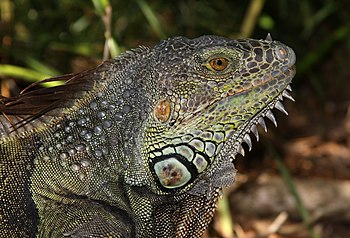If this is the first time that you'll be caring for an iguana, then it's probably best to acquaint yourself with the anatomy and basic behaviors of an iguana. By educating yourself, it will be easier to tell when there's something wrong with your new pet reptile. These are a few basic iguana facts you should know.
 |
| Adult male iguana (Iguana iguana) in Morikami Gardens, Delray Beach, Florida (Photo credit: Wikipedia) |
Iguanas Require Heat and UV Light
Iguanas are reptiles and, therefore, they need a consistent supply of heat and Ultra violet rays to stay healthy. Iguanas won't be able to function in habitat with a temperature which is lower than 79 degrees.
Ultra violet rays are necessary so the iguana is able to metabolize calcium and other minerals. Without Ultra violet rays, your iguana will probably experience bone mineral disorders that frequently result in their death.
Iguana Behavioral Characteristics
Iguanas can seem to be threatened fairly easily, and when you don't observe their mannerisms and behavior closely enough you may get bitten or hit by its massive tail. Unlike cats and dogs, iguanas will not vocalize a lot before biting, so be careful particularly if the iguana hasn't been fully tamed.
When you first bring your new pet home do not over handle him or overexpose him to strangers.
It will take a few weeks to gradually acclimate him to his new environment. Once he is comfortable in his new surrounding, begin to socialize him gradually and the bonding process will go much better.
The dewlap, or the large wad of skin beneath the iguana's jowls, is additionally used to communicate. In the wild, an iguana may raise its head to extend the dewlap to signal a basic "Hello" to members of its own species.
An extended dewlap may also mean that it is attempting to protect its territory from the human owner or from other iguanas. During mating season an extended dewlap may mean "I desire to mate". This only applies should there be female iguanas in the same enclosure, and it's mating season.
If your iguana has been tamed, and is used to your presence, an extended dewlap may signify it is just a little drafty and it's making an attempt to make itself feel warmer.
Iguana Mannerisms
Iguana Anatomy
Just like other reptiles, your iguana has a set of eyes that have evolved to scan the environment for food and potential predators. It has a pair of ears that are protected by a fairly wide element of skin called the subtympanic shield.
The iguana also forms spines along its back; these pliable spines are called the caudal spines and, as time passes, these grow in length and become harder. Iguanas also have a flap of skin under their lower jaw known as the dewlap.
Iguanas are herbivorous (they are nourished by plants only), so they are equipped with small, yet very sharp, teeth that are designed to tear apart fibrous plant matter. Be cautious when bringing your hands near the iguana's mouth, because those teeth can cause serious tears in your skin. If you look closely at the top of the iguana's head, you will observe a prominent, light patch of scale.
This is called the parietal eye, or third eye. The iguana uses its third eye to detect changes in light in a given area. It is thought this primordial eye is also used to detect flying predators, hence the iguana can make a run for cover before becoming another animal's lunch or dinner.
It is essential to learn about iguana behavior and mannerisms. The basic facts discussed in the article should help to decipher your iguana's moods. Don't forget that no two iguanas are exactly alike so you must also learn the personality of your new pet. Ask questions and gather as much information as possible to ensure that your iguana is long lived well cared for.
Sam Boothe has been keeping reptiles since childhood. Learn more about iguanas and iguana care at http://iguanacare-site.com to ensure your new pet lives a long and happy life. Article Source: EzineArticles |


No comments:
Post a Comment